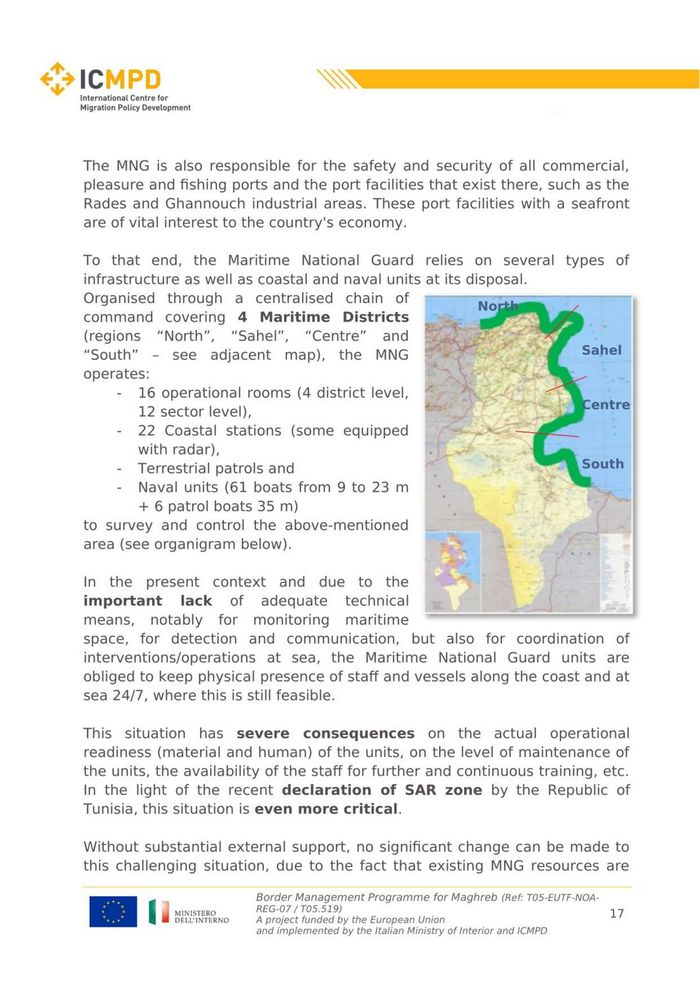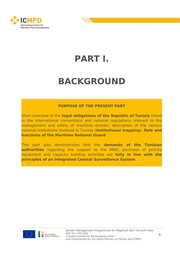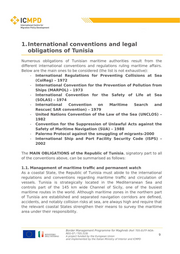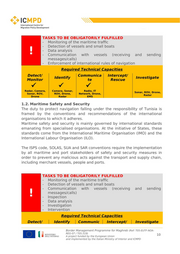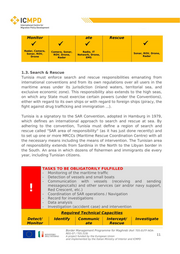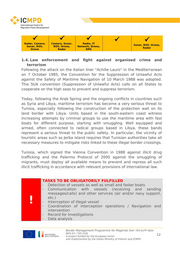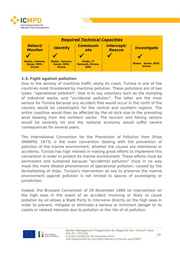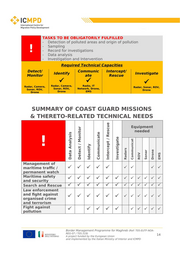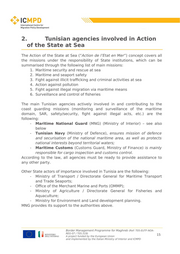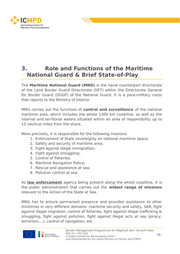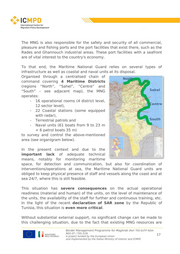Dossier_Integrated_Coastal_Surveillance_System_MNG_Tunisia_Nov_2019
&>ICMPD \ CH International Centre for Migration Policy Development PART. BACKGROUND Border Management Programme for Maghreb (Ref: T0O5-EUTF-NOA- ( i sign REG-07 / T05.519) 8 DELL'INTERNO A project funded by the European Union and implemented by the Italian Ministry of Interior and ICMPD
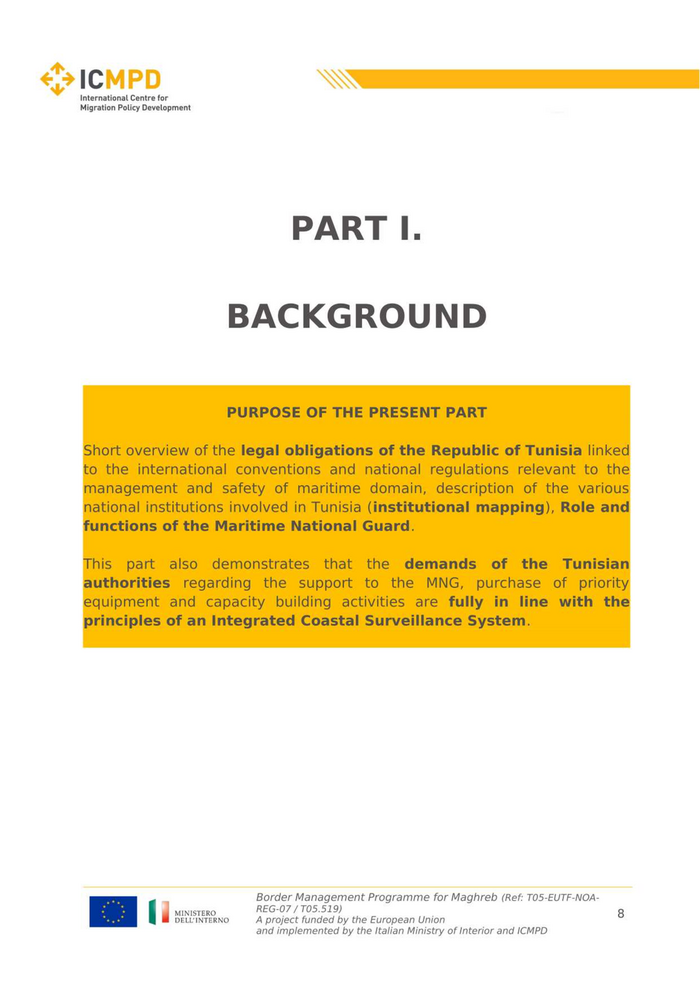
&>ICMPD \ CH International Centre for Migration Policy Development l.International conventions and legal obligations of Tunisia Numerous obligations of Tunisian maritime authorities result from the different international conventions and regulations ruling maritime affairs. Below are the main ones to be considered (the list is not exhaustive): - International Regulations for Preventing Collisions at Sea (ColReg) - 1972 - International Convention for the Prevention of Pollution from Ships (MARPOL) - 1973 - International Convention for the Safety of Life at Sea (SOLAS) - 1974 - International Convention on Maritime Search and Rescue( SAR convention) - 1979 - United Nations Convention of the Law of the Sea (UNCLOS) - 1982 - Convention for the Suppression of Unlawful Acts against the Safety of Maritime Navigation (SUA) - 1988 - Palermo Protocol against the smuggling of migrants-2000 - International Ship and Port Facility Security Code (ISPS) - 2002 The MAIN OBLIGATIONS of the Republic of Tunisia, signatory part to all of the conventions above, can be summarised as follows: 1.1. Management of maritime traffic and permanent watch As a coastal State, the Republic of Tunisia must abide to the international regulations and conventions regarding maritime traffic and circulation of vessels. Tunisia is strategically located in the Mediterranean Sea and controls part of the 145 km wide Channel of Sicily, one of the busiest maritime routes in the world. Although maritime zones in the northern part of Tunisia are established and separated navigation corridors are defined, accidents, and notably collision risks at sea, are always high and require that the relevant coastal States strengthen their means to survey the maritime area under their responsibility. Border Management Programme for Maghreb (Ref: T05-EUTF-NOA- h i unse REG-07 / T05.519) 9 DELL’INTERNO A project funded by the European Union and implemented by the Italian Ministry of Interior and ICMPD
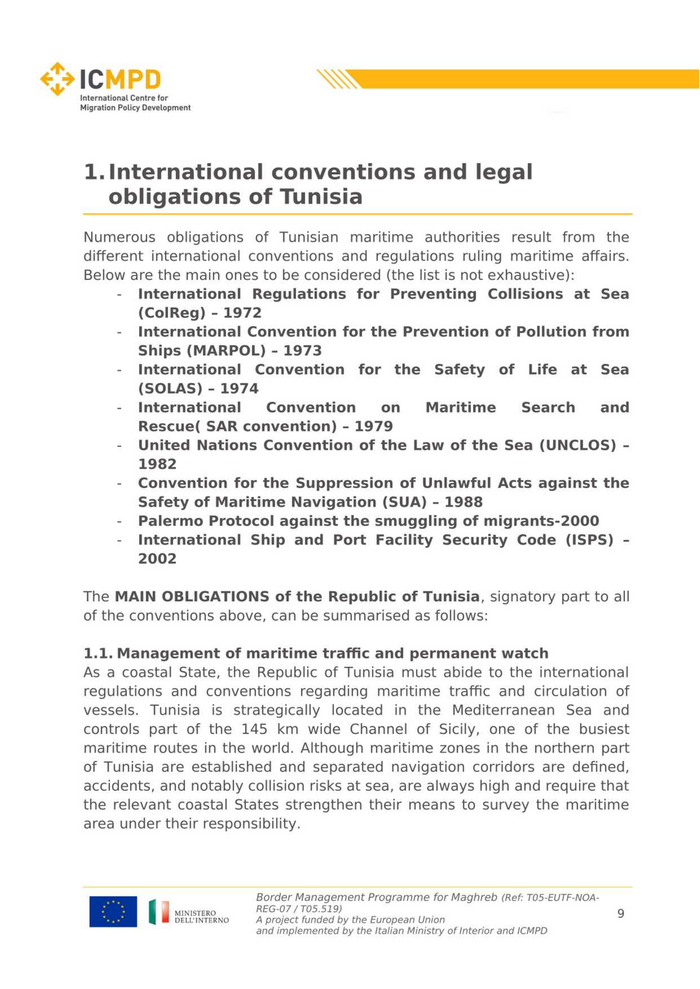
€. 2>ICMPD NG
International Centre for
Migration Policy Development
TASKS TO BE OBLIGATORILY FULFILLED
Monitoring of the maritime traffic
- Detection of vessels and small boats
- Data analysis
- Communication with vessels (receiving and sending
messagesj/calls)
Enforcement of international rules of navigation
1.2. Maritime Safety and Security
The duty to protect navigation falling under the responsibility of Tunisia is
framed by the conventions and recommendations of the international
organisations to which it adheres.
Maritime safety and security is mainly governed by international standards
emanating from specialised organisations. At the initiative of States, these
standards come from the International Maritime Organisation (IMO) and the
International Labour Organisation (ILO).
The ISPS code, SOLAS, SUA and SAR conventions require the implementation
by all maritime and port stakeholders of safety and security measures in
order to prevent any malicious acts against the transport and supply chain,
including merchant vessels, people and ports.
men TO BE OBLIGATORILY FULFILLED
Monitoring of the maritime traffic
- Detection of vessels and small boats
- Communication with vessels (receiving and sending
messagesj/calls)
- Inspection
- Data analysis
- Investigation
Intervention
MINISTERO REG-07 / T05.519) , 10
DELL'INTERNO A project funded by the European Union
ES ( E Border Management Programme for Maghreb (Ref: T05-EUTF-NOA-
and implemented by the Italian Ministry of Interior and ICMPD
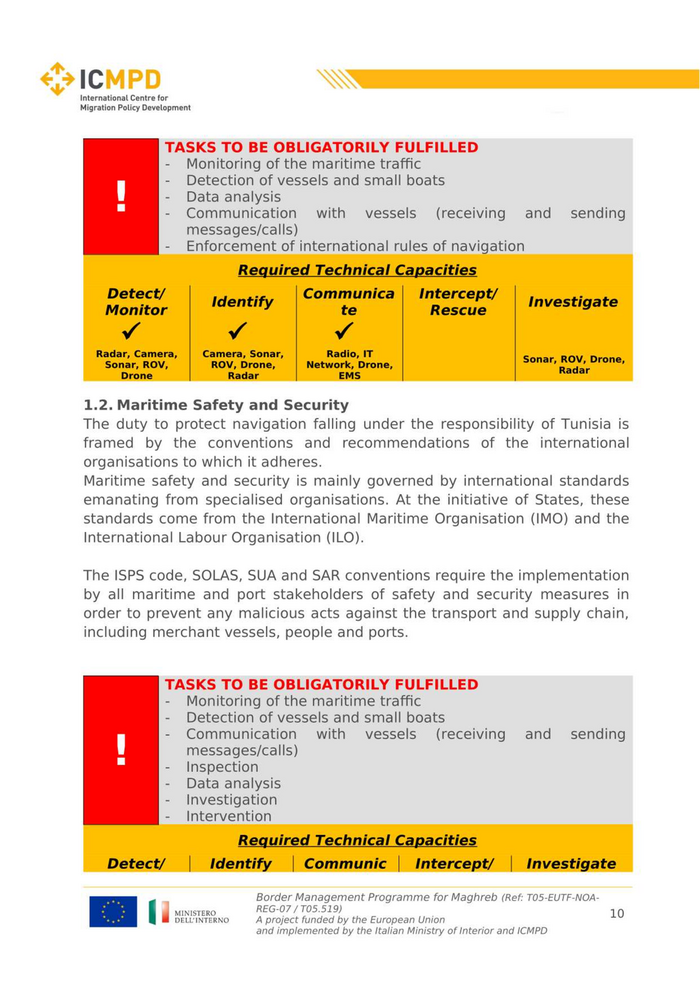
€. 2>ICMPD
International Centre for
Migration Policy Development
1.3. Search & Rescue
Tunisia must enforce search and rescue responsibilities emanating from
international conventions and from its own regulations over all users in the
maritime areas under its jurisdiction (inland waters, territorial sea, and
exclusive economic zone). This responsibility also extends to the high seas,
on which any State must exercise certain powers (under the Conventions),
either with regard to its own ships or with regard to foreign ships (piracy, the
fight against drug trafficking and immigration ...).
Tunisia is a signatory to the SAR Convention, adopted in Hamburg in 1979,
which defines an international approach to search and rescue at sea. By
adhering to the convention, Tunisia must define a region of search and
rescue called "SAR area of responsibility" (as it has just done recently) and
to set up one or more MRCCs (Maritime Rescue Coordination Centre) with all
the necessary means including the means of intervention. The Tunisian area
of responsibility extends from Sardinia in the North to the Libyan border in
the South. An area in which dozens of fishermen and immigrants die every
year, including Tunisian citizens.
ee TO BE OBLIGATORILY FULFILLED
Monitoring of the maritime traffic
- Detection of vessels and small boats
- Communication with vessels (receiviing and sending
messagesj/calls) and other services (air and/or navy support,
Red Crescent, etc.)
- Coordination of SAR operations / Navigation
- Record for investigations
- Data analysis
Investigation (accident case) and intervention
MINISTERO REG-07 / T05.519) 4
DELL’INTERNO A project funded by the European Union
E33 ( - Border Management Programme for Maghreb (Ref: T05-EUTF-NOA-
and implemented by the Italian Ministry of Interior and ICMPD
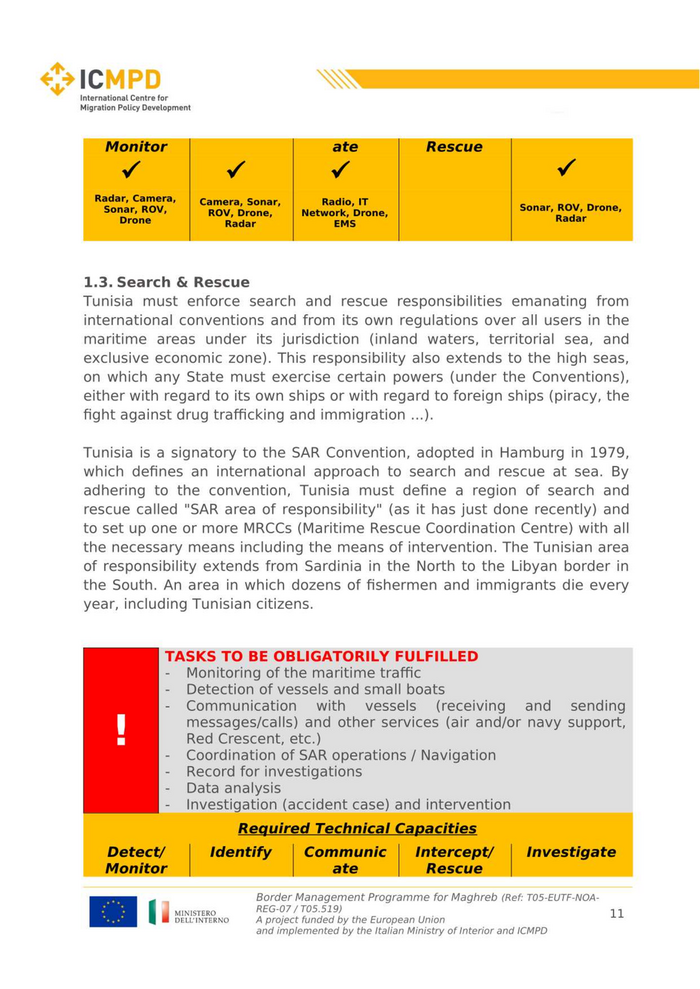
€ 7>ICMPD International Centre for Migration Policy Development 1.4.Law enforcement and fight against organised crime and terrorism Following the attack on the Italian liner "Achille Lauro" in the Mediterranean on 7 October 1985, the Convention for the Suppression of Unlawful Acts against the Safety of Maritime Navigation of 10 March 1988 was adopted. This SUA convention (Suppression of Unlawful Acts) calls on all States to cooperate on the high seas to prevent and suppress terrorism. Today, following the Arab Spring and the ongoing conflicts in countries such as Syria and Libya, maritime terrorism has become a very serious threat to Tunisia, especially following the construction of the protection wall on its land border with Libya. Units based in the south-eastern coast witness increasing attempts by criminal groups to use the maritime area with fast boats for different purpose, starting with smuggling. Well equipped and armed, often connected to radical groups based in Libya, these bands represent a serious threat to the public safety. In particular, the vicinity of touristic areas such as Jerba island requires that Tunisian authorities take all necessary measures to mitigate risks linked to these illegal border crossings. Tunisia, which signed the Vienna Convention in 1988 against illicit drug trafficking and the Palermo Protocol of 2000 against the smuggling of migrants, must deploy all available means to prevent and repress all such illicit trafficking in accordance with relevant provisions of international law. aa TO BE OBLIGATORILY FULFILLED Detection of vessels as well as small and faster boats - Communication with vessels (receiviing and sending messages/calls) and other services (air and/or navy support, etc.) - Interception of illegal vessel - Coordination of interception operations / Navigation and intervention - Record for investigations - Data analysis MINISTERO REG-07 / T05.519) 5 DELL’INTERNO A project funded by the European Union E33 ( ] Border Management Programme for Maghreb (Ref: T05-EUTF-NOA- and implemented by the Italian Ministry of Interior and ICMPD
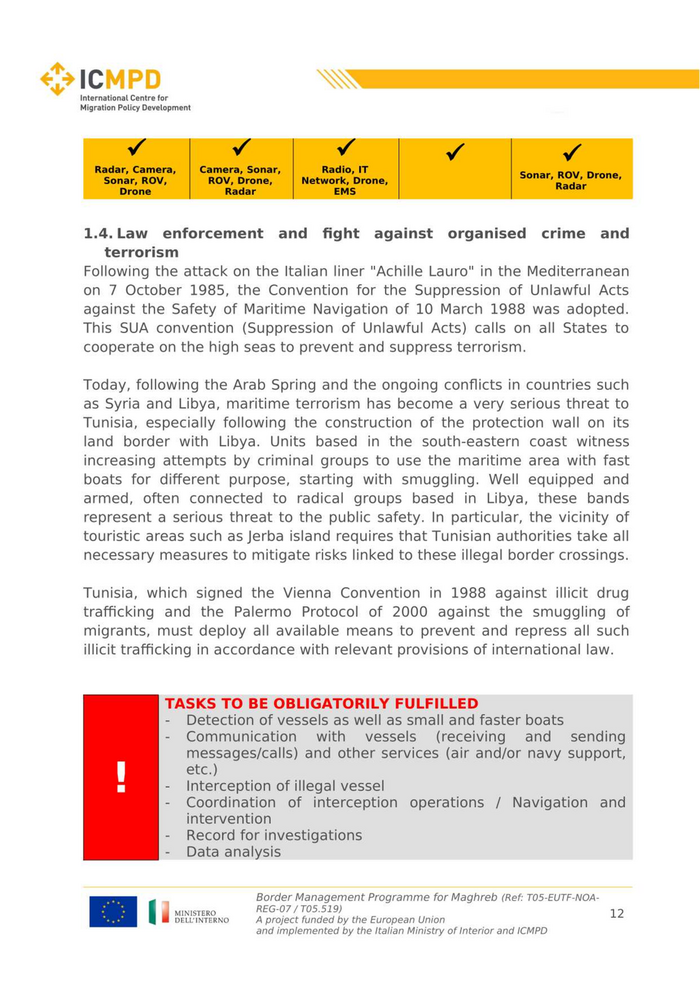
&>ICMPD International Centre for Migration Policy Development 1.5. Fight against pollution Due to the density of maritime traffic along its coast, Tunisia is one of the countries most threatened by maritime pollution. These pollutions are of two types: "operational pollution", that is to say voluntary such as the dumping of industrial waste, and "accidental pollution". The latter are the most serious for Tunisia because any accident that would occur in the north of the country would be catastrophic for the central and southern regions. The entire coastline would then be affected by the oil slick due to the prevailing wind blowing from the northern sector. The tourism and fishing sectors would be severely hit and the national economy would suffer severe consequences for several years. The International Convention for the Prevention of Pollution from Ships (MARPOL 1973) is the main convention dealing with the prevention of pollution of the marine environment, whether the causes are intentional or accidents. Tunisia has high interest in making great efforts to implement this convention in order to protect its marine environment. These efforts must be permanent and sustained because "accidental pollution" must in no way mask the more diluted phenomenon of operational pollution, caused by the de-ballasting of ships. Tunisia's intervention at sea to preserve the marine environment against pollution is not limited to spaces of sovereignty or jurisdiction. Indeed, the Brussels Convention of 29 November 1969 on intervention on the high seas in the event of an accident involving or likely to cause pollution by oil allows a State Party to intervene directly on the high seas in order to prevent, mitigate or eliminate a serious or imminent danger to its coasts or related interests due to pollution or the risk of oil pollution. REG-07 / T05.519) MINISTERO DELLINTERNO A project funded by the European Union 13 ES ( l Border Management Programme for Maghreb (Ref: T0O5-EUTF-NOA- and implemented by the Italian Ministry of Interior and ICMPD
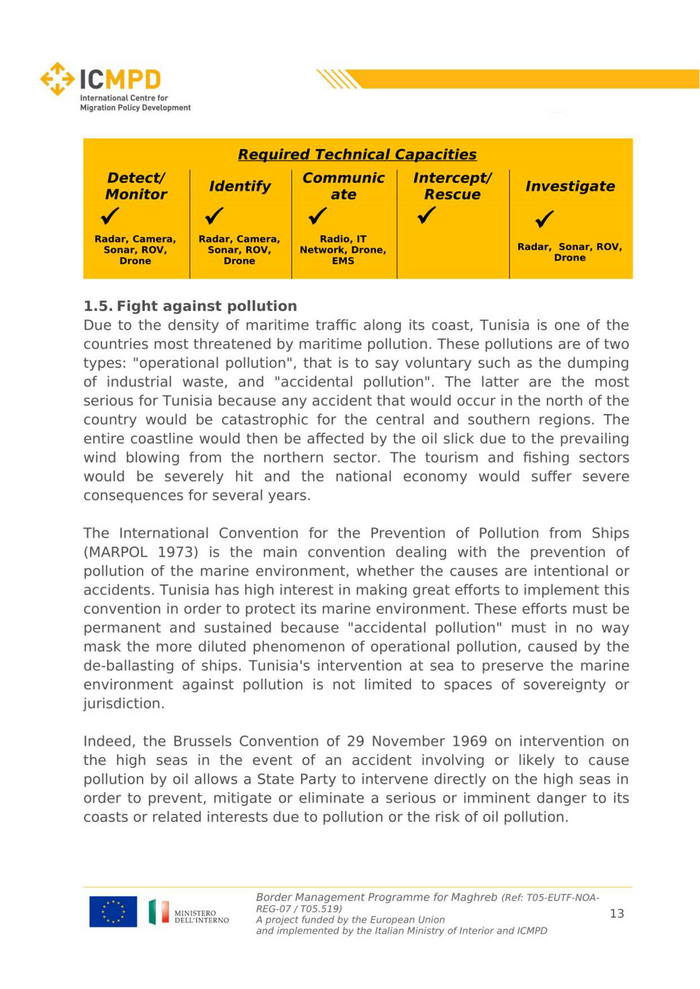
€ 2>ICMPD NT GE
International Centre for
Migration Policy Development
TASKS TO BE OBLIGATORILY FULFILLED
Detection of polluted areas and origin of pollution
- Sampling
- Record for investigations
- Data analysis
Investigation and Intervention
SUMMARY OF COAST GUARD MISSIONS
& THERETO-RELATED TECHNICAL NEEDS
Equipment
needed
Intercept / Rescue
te Investigate
Detect / Monitor
fen
Management of
maritime traffic /
permanent watch
v
Maritime safety v
and securit
Search and Rescue |Y |V | KEREREE % 7 u z
Law enforcement
and fight against s\2|\v Bl als
organised crime
and terrorism
Pen ei ledlelehteli 2a
pollution
u
=
©
E
<
ro
4
[
O
DE Communicate
MINISTERO REG-07 / T05.519) , 14
DELL'INTERNO A project funded by the European Union
ES ( - Border Management Programme for Maghreb (Ref: T05-EUTF-NOA-
and implemented by the Italian Ministry of Interior and ICMPD
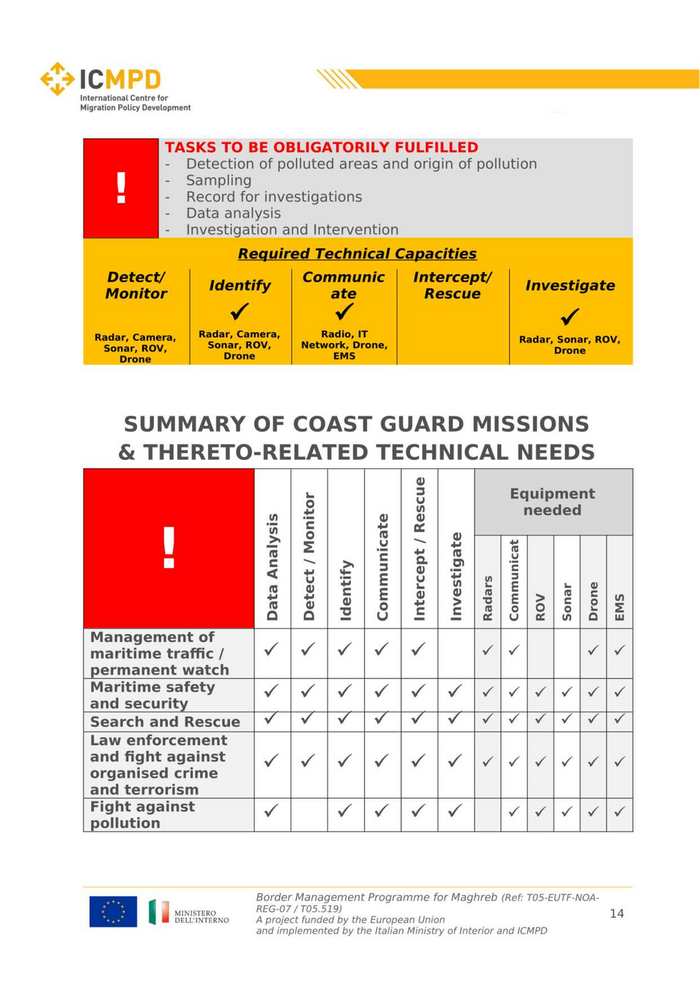
&>ICMPD N International Centre for Migration Policy Development 2. Tunisian agencies involved in Action of the State at Sea The Action of the State at Sea (“Action de I’Etat en Mer”) concept covers all the missions under the responsibility of State institutions, which can be summarised through the following list of main missions: 1. Maritime security and rescue at sea . Maritime and seaport safety . Fight against illicit trafficking and criminal activities at sea . Action against pollution . Fight against illegal migration via maritime means . Surveillance and control of fisheries QVUPRWN The main Tunisian agencies actively involved in and contributing to the coast guarding missions (monitoring and surveillance of the maritime domain, SAR, safety/security, fight against illegal acts, etc.) are the following: - Maritime National Guard (MNG) (Ministry of Interior) - see also below - Tunisian Navy (Ministry of Defence), ensures mission of defence and securisation of the national maritime area, as well as protects national interests beyond territorial waters; - Maritime Customs (Customs Guard, Ministry of Finance) is mainly responsible for cargo inspection and customs control. According to the law, all agencies must be ready to provide assistance to any other party. Other State actors of importance involved in Tunisia are the following: - Ministry of Transport / Directorate General for Maritime Transport and Trade Seaports; - Office of the Merchant Marine and Ports (OMMP); - Ministry of Agriculture / Directorate General for Fisheries and Aquaculture; - Ministry for Environment and Land development planning. MNG provides its support to the authorities above. Border Management Programme for Maghreb (Ref: T05-EUTF-NOA- REG-07 / T05.519) \ISTERO 3] h i DELLINTERNO A project funded by the European Union 15 and implemented by the Italian Ministry of Interior and ICMPD
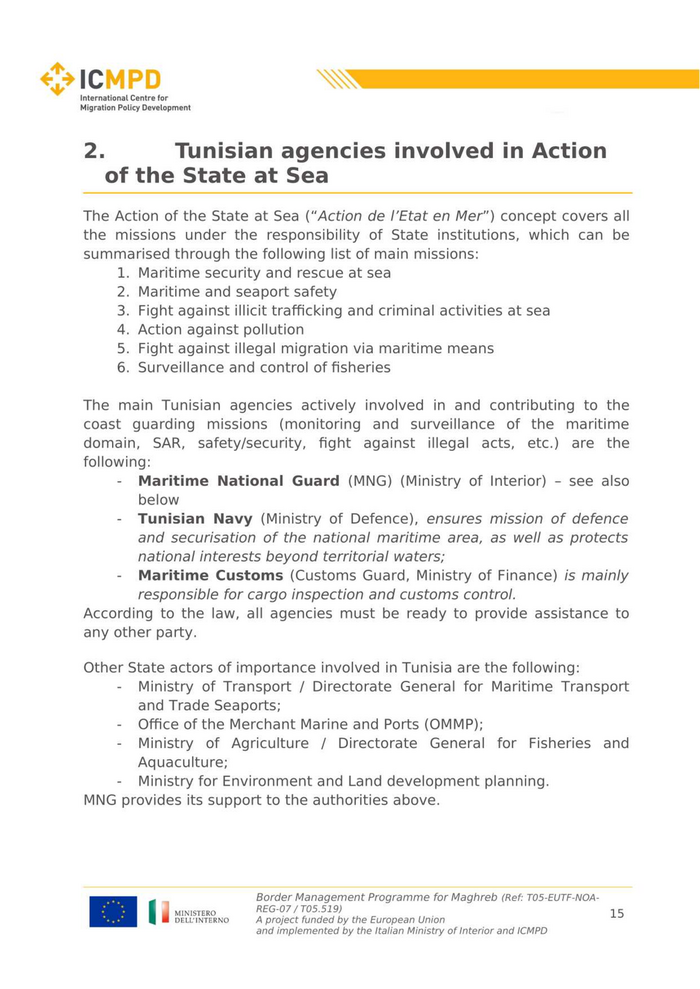
&>ICMPD N International Centre for Migration Policy Development 3. Role and Functions of the Maritime National Guard & Brief State-of-Play The Maritime National Guard (MNG) is the naval counterpart directorate of the Land Border Guard Directorate (DFT) within the Directorate General for Border Guard (DGGF) of the National Guard. It is a para-military corps that reports to the Ministry of Interior. MNG carries out the functions of control and surveillance of the national maritime area, which includes the whole 1300 km coastline, as well as the internal and territorial waters situated within an area of responsibility up to 12 nautical miles from the shore. More precisely, it is responsible for the following missions: . Enforcement of State sovereignty on national maritime space; . Safety and security of maritime area; . Fight against illegal immigration; . Fight against smuggling; . Control of fisheries; . Maritime Navigation Police; . Rescue and assistance at sea; . Pollution control at sea. OS UVUPWDNH As law enforcement agency being present along the whole coastline, it is the public administration that carries out the widest range of missions relevant to the Action of the State at Sea. MNG has to ensure permanent presence and provides assistance to other ministries in very different domains: maritime security and safety, SAR, fight against illegal migration, control of fisheries, fight against illegal trafficking & smuggling, fight against pollution, fight against illegal acts at sea (piracy, terrorism,...), control of navigation, etc. Border Management Programme for Maghreb (Ref: T05-EUTF-NOA- REG-07 / T05.519) \ISTERO 3] h i DELLINTERNO A project funded by the European Union 16 and implemented by the Italian Ministry of Interior and ICMPD
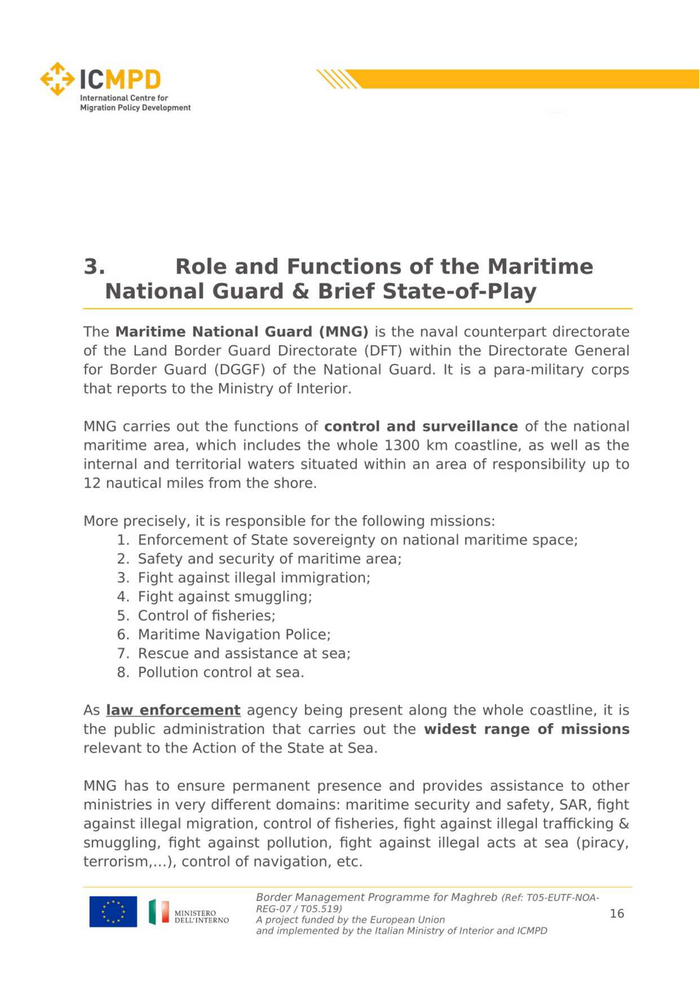
&>ICMPD \ CH International Centre for Migration Policy Development The MNG is also responsible for the safety and security of all commercial, pleasure and fishing ports and the port facilities that exist there, such as the Rades and Ghannouch industrial areas. These port facilities with a seafront are of vital interest to the country's economy. To that end, the Maritime National Guard relies on several types of infrastructure as well as coastal and naval units at its disposal. Organised through a centralised chain of command covering 4 Maritime Districts (regions “North”, “Sahel”, “Centre” and “South” - see adjacent map), the MNG operätes: - 16 operational rooms (4 district level, 12 sector level), - 22 Coastal stations (some equipped with radar), - Terrestrial patrols and - Naval units (61 boats from 9 to 23 m + 6 patrol boats 35 m) to survey and control the above-mentioned area (see organigram below). In the present context and due to the important lack of adequate technical means, notably for monitoring maritime space, for detection and communication, but also for coordination of interventions/operations at sea, the Maritime National Guard units are obliged to keep physical presence of staff and vessels along the coast and at sea 24/7, where this is still feasible. This situation has severe consequences on the actual operational readiness (material and human) of the units, on the level of maintenance of the units, the availability of the staff for further and continuous training, etc. In the light of the recent declaration of SAR zone by the Republic of Tunisia, this situation is even more critical. Without substantial external support, no significant change can be made to this challenging situation, due to the fact that existing MNG resources are Border Management Programme for Maghreb (Ref: T0O5-EUTF-NOA- REG-07 / T05.519) 3] h i DELLINTERNO A project funded by the European Union 17 and implemented by the Italian Ministry of Interior and ICMPD
